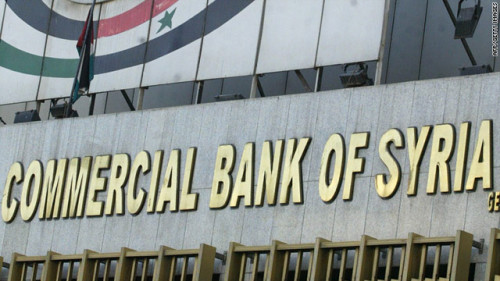Amid the economic crisis accompanying Syria’s 4 1/2 conflict — including sharp fall in GDP, damage to infrastructure, and the devaluation of the currency by more than 80% — the country’s banks still function.
Writing for The Washington Post, Rashad al-Kattan of St. Andrews University in Scotland explains the reasons, including changes in economic policy before 2011 and a financial elite tightly linked to the Assad regime:
After years of devastating conflict and crippling international sanctions, the Syrian economy is largely in shambles. However, contrary to the expectations of the United States and the European Union, Syrian banks have largely weathered the storm.
My recent research on disclosures made by publicly listed private banks investigates this resilience. Although the Syrian banks have indeed taken a hard beating, struggling with the shrinking economy, international sanctions, and absence of public and private investments, none of the six state-owned banks have suspended their operations.
Additionally, the 14 private banks — primarily subsidiaries of regional Arab banks in Lebanon, Jordan, Qatar, Saudi Arabia, Kuwait and Bahrain — have decided to stay put until the resolution of the conflict and will likely remain in the country for the long haul. These banks have endured physical destruction of their branches and offices in violence-ridden cities, robberies by gangs and militias on both warring sides, tighter inspection of their foreign-currency operations and embezzlement by some of their own staff.
Understanding this resilience takes us back to the dramatic changes in the country’s banking sector in the decade leading up to the 2011 uprising. The government’s decision to liberalize the banking sector in 2003 following the accession to power of President Bashar al-Assad after his father Hafez al-Assad’s death in 2000 technically ended the state monopoly over the financial system that dated back to the nationalization of Syria’s private banks in the 1960s. This watershed moment for the Syrian economy was part of the government’s plan to move toward a social-market economy, with the vision of eventually adopting capitalist market principles as previously detailed by Samir Seifan.
Bashar aimed to revamp the three decades of populist structure in an “authoritarian upgrading” to pursue neo-liberal economic policies, eventually shifting public assets to a network of crony capitalists close to the regime. The abandonment of socialist policies in a post-populist era culminated with the establishment of the Damascus Securities Exchange (DSE) in 2009. The number of firms listed on the exchange has since grown, even after 2011, and currently comprises 23 companies spanning sectors such as transport, media, industry, agriculture, banking and insurance. Publicly listed private banks operating in the country have dominated the exchange’s value and trading activities.

